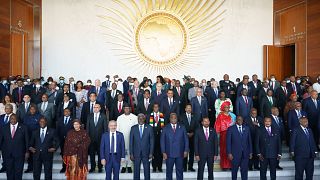free trade
Trading under the African Continental Free Trade Area (AfCFTA) finally kicked off on January 1, 2021, to a lot of excitement, after being delayed for six months due to the pandemic.
The AfCFTA unites an estimated $3 trillion market and could help to realize more than $84 billion in untapped intra-African exports, according to a report by the African Export-Import Bank (Afreximbank).
Countries now have to harmonize customs and tariff regimes.
But Wamkele Mene, the Secretary-General of the AfCFTA secretariat admits that restrictions prompted by Covid-19 have slowed down progress.
Africanews journalist Neusa e Silva interviewed Wamkele during his trip to Angola recently.
Africanews: Welcome, Mr. Secretary-General. With the launch of the continental free trade area, there is also the issue of the single passport to facilitate movement and a single currency for transactions? How far with this?
Wamkele: The protocol on the movement of persons is a separate instrument, it is not part of the African Continental Free Trade Area (AfCFTA), it is an instrument that was negotiated separately, it has not yet entered into force, so it is not moving as quickly as we would like to see, that is because countries have to make their own considerations about ratifying it, but the underlying point that you make is absolutely correct, that we need to move quickly on the free movement of persons to enable commerce and trade to be accelerated on the African continent. The single currency is something that is a long-term objective, I am not in a position to say when it will happen, what I can say is that, in the interim, along with Afreximbank, we are taking the step of establishing a pan-African payments and settlements platform, which will be a digital platform for facilitating trade, and we believe that it is a step in the direction of eventually Africa having a single currency.
Africanews: Are you talking with any banks about this?
Wamkele: We are in conversations now with African banks about trade facilitation, trade finance rather, trade finance facility to support the implementation of the AfCFTA, I mentioned also the work we are doing with our strategic partner, Afreximbank, to make sure that there is the finance component that supports the implementation of the AfCFTA, and we are looking at a different range of tools to facilitate the implementation of the AfCFTA, we are looking at digital platforms, we are looking at the connectivity of small and medium enterprises and their aspects that you mentioned and that is work that we are doing to mobilize resources for trade, finance, to do so with African banks.
Africanews: How can the experience of the European Union serve as a model or blueprint to make the AfCFTA work?
Wamkele: The European Union is probably the most successful integration story of our time, it has been very successful but, of course, as we have seen in recent years, there have been shortcomings in that integration model of the European Union. When we were negotiating this agreement we looked at what is it that has worked best in the integration model of the European Union, and what we observed is that taking a gradual approach, like the European Union did, taking a gradual approach to integration is the right thing to do, we also observed that ensuring that there is inclusivity in the development of the economic integration model that all countries benefit from the integration that is undertaken is also, in the long term, a factor that ensures the sustainability of the regional economic integration objective.
Africanews: What has been the impact of lockdowns and other restrictions due to Covid-19?
Wamkele: As you know it has had a very severe impact on Africa’s economy. For the first time, there is a technical recession that Africa… sub-Saharan Africa is experiencing, for the first time in almost 30 years, but I believe that through the implementation of AfCFTA, aggressively implementing it, this how Africa will come out of this recession that we are in.
Regarding national efforts at implementation, many, many countries, as I said earlier, are now in the process of establishing the customs procedures that are required to make sure that goods are crossing into their border that they can apply the rules of the AfCFTA. That process takes quite a long time, and it requires a lot of effort, and so we have to be patient, that countries are engaged in this process of establishing the customs procedures that are needed.











Go to video
AU names Burundian president special envoy for Sahel region
11:19
Cocoa is under pressure while East African economy is on the rise {Business Africa}
11:17
Bridging the legal gap in Africa’s digital boom {Business Africa}
01:54
"Great economic potential in Africa": five African leaders have lunch with Trump
11:19
Cyber Africa Forum highlights Benin's bold digital resilience [Business Africa]
01:10
At least three killed after AU military helicopter crashes in Somalia's Mogadishu airport